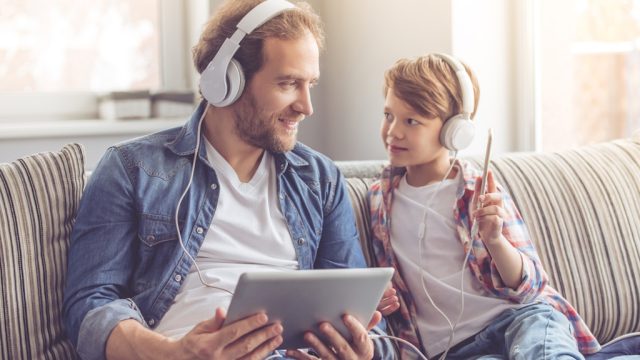This Is the Secret to Having a Strong Bond with Your Teen

Growing up, my father and I didn’t talk much, but we listened to a lot of music together. We poured over The Beatles, Led Zeppelin, and Freddie Mercury during long rides in the car and barbecues in our backyard, and even though we didn’t say anything, it felt like we were bonding.
Now, a new study proves that the benefit of imbibing these classic songs together wasn’t all in my head. New research by the University of Arizona, published in the Journal of Family Communication, has discovered that people who reported sharing musical experiences with their parents in their childhood and early teens reported having a better relationship with them as they entered early adulthood.
To conduct the study, Jake Harwood, professor and head of the UA Department of Communication, and his colleagues surveyed a group of young adults with an average age of 21 about the frequency with which they listened to music together or went to concerts as kids, and compared their responses with how they perceive their relationship with their parents today. Controlling for other factors, they consistently found that those who had shared musical experiences with their parents, particularly as adolescents, reported having a closer bond with their folks.
“With young kids, musical activity is fairly common—singing lullabies, doing nursery rhymes,” Harwood said. “With teenagers, it’s less common, and when things are less common you might find bigger effects, because when these things happen, they’re super important.”
The researchers identified two key factors as the reason music may play a bigger role in fostering a positive bond than other activities, such as watching TV. The first is coordination.
“Synchronization, or coordination, is something that happens when people play music together or listen to music together,” Harwood said. “If you play music with your parent or listen to music with your parents, you might do synchronized activities like dancing or singing together, and data shows that that causes you to like one another more.”
The second is the way music cultivates feelings of empathy.
“A lot of recent research has focused on how emotions can be evoked through music, and how that can perpetuate empathy and empathic responses toward your listening partner,” Sandi Wallace, a former undergraduate student in Harwood’s class in music and communication and lead author of the study, said.
The implications of the study are especially important today, given that kids are so often buried in their phones or off in their own little world with their headphones on. A recent study found that, surprisingly, Americans between the ages of 18 and 22 are the loneliest social group, thanks in large part to the growing rise of tech addiction and the lack of communication the iGeneration has with their fellow peers. The dependency on technology is so extreme, in fact, that schools in the UK have started to remove analog clocks from classrooms because kids report not being able to tell time.
So tell your kids to take those headphones off and introduce them to some of the music you love. And for more great parenting advice, check out 40 Parenting Hacks for Raising an Amazing Kid.
To discover more amazing secrets about living your best life, click here to sign up for our FREE daily newsletter!